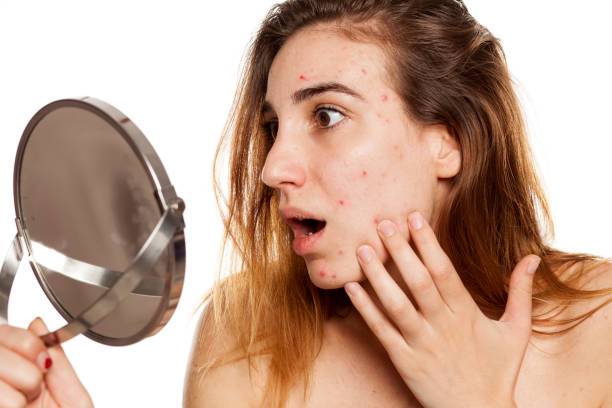
Acne: how to combat this condition
Acne is one of the most common skin conditions worldwide, and Colombia is no exception.
This disorder can affect people of all ages, although it is more frequent in teenagers and young adults. In this article, we will explore what acne is, its causes, available treatments, and prevention methods, all tailored to the needs and resources available in Colombia.
What Is Acne?
Acne is an inflammatory skin condition that occurs when hair follicles become clogged with sebum (natural skin oil) and dead skin cells. This blockage can lead to the formation of pimples, blackheads, cysts, and nodules.
While considered a benign condition, acne can significantly impact the self-esteem and emotional well-being of those affected, especially if it is severe or leaves scars.
Who Is Most Prone to Acne?
Acne is a common skin condition that can affect people of any age, gender, or ethnicity. However, certain factors and characteristics increase the likelihood of developing it. Below are the groups most at risk:
Teenagers and Young Adults
- Hormonal Changes: During puberty, increased androgen hormones stimulate sebum production in sebaceous glands, which can clog pores and cause acne.
- Prevalence at This Stage: Acne is most common between the ages of 12 and 24 but can persist into the 30s or later.
People with Genetic Predisposition
- Family History: Having one or both parents with severe acne increases the likelihood of developing it.
- Hereditary Traits: These include higher sebum production or a stronger inflammatory response.
Women at Specific Life Stages
- Menstrual Cycle: Many women experience acne breakouts before or during their period due to hormonal fluctuations.
- Pregnancy: Hormonal changes during pregnancy can trigger or worsen acne.
- Polycystic Ovary Syndrome (PCOS): This condition can cause hormonal imbalances, contributing to acne.
People with Oily Skin
- Skin Type: Those with oily skin are more prone to acne as their sebaceous glands produce more oil, increasing pore blockage risk.
Individuals Exposed to Environmental Factors
- Warm and Humid Climates: These conditions promote sebum production and bacterial growth on the skin.
- Exposure to Pollutants: Pollution can clog pores and exacerbate inflammation.
People Using Certain Products
- Comedogenic Cosmetics: Products that clog pores, such as unsuitable makeup or creams.
- Oily Hair Products: These can obstruct the skin around the scalp and forehead.
People Under Stress
- Hormonal Impact: Stress raises cortisol levels, which can increase sebum production and lead to breakouts.
People with Diets High in Certain Foods
- High Glycemic Index Foods: Sugars and refined carbohydrates can stimulate sebum production.
- Dairy Products: In some individuals, consuming milk and dairy is associated with increased acne.
Users of Certain Medications
- Side Effects: Some drugs, such as steroids, anticonvulsants, or lithium, can trigger acne outbreaks.
Main Causes of Acne
Acne can result from various factors, including:
- Excess Sebum Production: Oily skin is more prone to acne.
- Dead Skin Cell Build-Up: These can clog pores.
- Bacterial Activity: Cutibacterium acnes bacteria can cause inflammation.
- Hormonal Changes: Hormonal fluctuations during puberty, pregnancy, or menstrual cycles can increase sebaceous gland activity.
- Genetics: A family history of acne increases the risk.
- Lifestyle and Diet: Though not a direct cause, diets rich in sugars and dairy can aggravate acne.
- Stress: Can worsen breakouts by stimulating sebum production.
Types of Acne
Acne can be categorized based on its severity and appearance:
- Comedonal Acne: Includes blackheads and whiteheads.
- Inflammatory Acne: Characterized by red pustules and papules.
- Nodulocystic Acne: Severe form with painful cysts.
- Acne Fulminans: A rare but severe type that can cause fever and pain.
Acne Treatments in Colombia
In Colombia, there are various treatment options for acne, depending on its severity and the specific needs of each patient:
Topical Treatments
- Retinoids: Help unclog pores and prevent new breakouts.
- Benzoyl Peroxide: Reduces bacteria and inflammation.
- Salicylic Acid: Gently exfoliates and unclogs pores.
Oral Medications
- Antibiotics: Recommended for moderate to severe cases.
- Isotretinoin: A potent treatment reserved for severe or resistant acne.
- Oral Contraceptives: Help regulate hormones in women.
Advanced Dermatological Treatments
- Laser or Light Therapy: Effective in reducing inflammation and improving skin appearance.
- Chemical Peels: Remove dead cells and reduce scars.
- Microdermabrasion: Smoothens skin texture and minimizes blemishes.
- Dermocosmetic Products: Available in pharmacies, such as oil-free cleansers and moisturizers designed for acne-prone skin.
Preventing Acne
While acne cannot always be avoided, certain habits can reduce its occurrence:
- Proper Skincare Routine: Wash your face twice a day with a gentle cleanser.
- Avoid Touching Your Face: Prevents the spread of bacteria.
- Use Non-Comedogenic Products: Choose cosmetics and sunscreens that do not clog pores.
- Maintain a Balanced Diet: Reduce intake of high-glycemic foods.
- Stress Management: Practice relaxation techniques such as yoga or meditation.
Which Specialist Should You See?
The specialist who treats acne is a Dermatologist, a physician specializing in diagnosing and treating skin, hair, and nail conditions. Dermatologists are experienced in managing various types and severities of acne, from mild cases to severe acne that may cause scarring.
If acne is linked to hormonal imbalances (e.g., in women with PCOS), the dermatologist may collaborate with other specialists, such as endocrinologists or gynecologists, to address the underlying cause.
You should consult a dermatologist if:
- Over-the-counter treatments are ineffective.
- Painful cysts or nodules are present.
- Acne impacts your self-esteem or quality of life.
- There are scars or persistent blemishes.
In Colombia, many dermatology specialists offer personalized treatments to combat acne, including those affiliated with EPS or working in private clinics.
Acne is a treatable condition that, with the right approach, can be effectively managed. While Colombia offers a variety of accessible treatments, maintaining a skincare routine and adopting healthy habits are key to preventing new breakouts. If you struggle with acne, don’t hesitate to consult a dermatologist for personalized treatment that improves your health and confidence.
